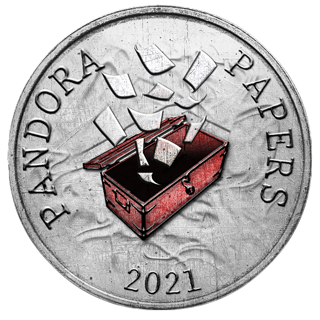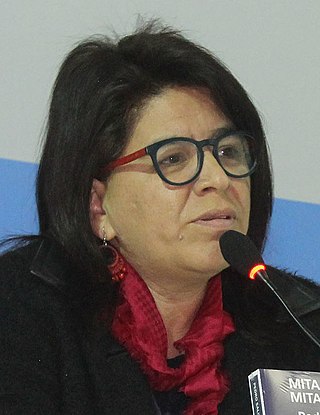
Gustavo Andrés Gorriti Ellenbogen is a Peruvian journalist known for his reporting on rebel groups, government corruption, and drug trafficking. In 2011, the European Journalism Centre described him as having "been awarded more prizes than probably any other Peruvian journalist". He is the founder of IDL-Reporteros.
The mass media in Peru includes a variety of different types of media, including television, radio, cinema, newspapers, magazines, and Internet-based web sites. Much of the print-based media in Peru is over a century old, with some newspapers even dating back to the time of independence.
The Organized Crime and Corruption Reporting Project (OCCRP) is a global network of investigative journalists with staff on six continents. It was founded in 2006 and specializes in organized crime and corruption.
The International Consortium of Investigative Journalists, Inc. (ICIJ), is an independent global network of 280 investigative journalists and over 140 media organizations spanning more than 100 countries. It is based in Washington, D.C., with personnel in Australia, France, Spain, Hungary, Serbia, Belgium and Ireland.
César Batiz is a Venezuelan investigative journalist. He previously worked with the country's largest newspaper, Últimas Noticias, and is currently the director of Poderopedia and El Pitazo. In many of his writings, he has taken on issues of corruption that have put him at odds with the governments of Hugo Chávez and Nicolás Maduro.
Prodavinci is a Venezuelan news site that provides analysis from historians, scholars and scientists. Foreign Policy called Prodavinci "a one-stop shop for Spanish-language analysis of the Venezuelan reality" while The Wall Street Journal described the website as having "serious political analysis".
OjoPúblico is a Peruvian investigative journalism website founded in 2014 by journalists Oscar Castilla Contreras, Nelly Luna Amancio, David Hidalgo and Fabiola Torres, as well as the programmer Antonio Cucho. It investigates issues concerning human rights, corruption, drug trafficking, environment, health and transparency, among others.
The Global Investigative Journalism Network (GIJN) is "an international association of nonprofit organizations that support, promote and produce investigative journalism." The association is headquartered in the United States, and its membership is open to "nonprofits, NGOs, and educational organizations" that are active in investigative reporting and data journalism.

Francisco "Paco" Marhuenda García is a Spanish journalist, professor and former politician.
Armando.Info is a Venezuelan investigative journalism website that was founded in 2014. Armando.info is a long-term partner of the International Consortium of Investigative Journalists and has worked on many projects, including the Panama Papers and Paradise Papers.

Giannina Segnini Picado is a Costa Rican journalist recognized for having uncovered two political scandals that led to convictions of former presidents – the ICE-Alcatel and Caja-Fischel cases. She has become a distinguished figure in Latin America for her work in investigative and data journalism.
Patricia Majluf Chiok is a Peruvian biologist, zoologist, researcher and conservationist. She founded the Center for Environmental Sustainability (CSA) at the Cayetano Heredia University in 2006. She is currently the Vice President in Peru of Oceana, a non-profit organization dedicated to the protection of the oceans.

The Cuellos Blancos scandal or the CNM Audios scandal is a judicial scandal caused by the revelation of audio recordings of judges and their staff, with the most notable individual being Associative Justice of the Supreme Court of Peru César Hinostroza, allegedly discussing bribes and reducing criminal penalties. These judges were part of the National Council of Magistracy. The scandal was revealed by an initiative led by the investigative journalism website IDL-Reporteros, which ultimately collected over 63,000 audio recordings that reportedly unveiled one of the largest corruption networks in Peru's judicial history. Following the scandal, the CNM would be restructured into the National Board of Justice (JNJ).

The Pandora Papers are 11.9 million leaked documents with 2.9 terabytes of data that the International Consortium of Investigative Journalists (ICIJ) published beginning on 3 October 2021. The leak exposed the secret offshore accounts of 35 world leaders, including current and former presidents, prime ministers, and heads of state as well as more than 100 business leaders, billionaires, and celebrities. The news organizations of the ICIJ described the document leak as their most expansive exposé of financial secrecy yet, containing documents, images, emails and spreadsheets from 14 financial service companies, in nations including Panama, Switzerland and the United Arab Emirates. The size of the leak surpassed their previous release of the Panama Papers in 2016, which had 11.5 million confidential documents and 2.6 terabytes of data. The ICIJ said it is not identifying its source for the documents.

Liz Patricia Benavides Vargas is a Peruvian lawyer. On June 20, 2022, she was elected as Attorney General of Peru and was removed from her position on 7 December 2023 as a result of the Peruvian Public Ministry controversy.

The Ayacucho massacre was a massacre perpetrated by the Peruvian Army on 15 December 2022 in Ayacucho, Peru during the 2022–2023 Peruvian protests, occurring one day after President Dina Boluarte, with the support of right-wing parties in Congress, granted the Peruvian Armed Forces expanded powers and the ability to respond to demonstrations. The clash occurred due to the protesters' attempt to storm the local airport. On that day, demonstrations took place in Ayacucho and the situation intensified when the military deployed helicopters to fire at protesters, who later tried to take over the city's airport, which was defended by the Peruvian Army and the National Police of Peru. Troops responded by firing live ammunition at protesters, resulting in ten dead and 61 injured. Among the injured, 90% had gunshot wounds, while those killed were shot in the head or torso. Nine of the ten killed had wounds consistent with the ammunition used in the IMI Galil service rifle used by the army.
Jennifer Ávila Reyes is a Honduran journalist, documentary filmmaker and researcher. In 2017, she founded the media company Contracorriente and is currently its director. Its primary aim is to uncover corruption and violence against children and women.

An investigation surrounding the Public Ministry of Peru, known as Operation Valkyrie V resulted with a controversy surrounding the Attorney General of Peru, Patricia Benavides, who was alleged to head a criminal organization. The scandal revolved around alleged irregularities with the decisions of electing the Ombudsman of Peru Josué Gutiérrez Cóndor, dismissing former attorney general Zoraida Ávalos and attempts to remove the members of the National Board of Justice (JNJ), all in reported attempts for Benavides to main control of the Public Ministry by nominating allies in judicial positions.
Ronna Rísquez is a Venezuelan investigative journalist. Rísquez has worked for El Nacional and Runrunes media, in addition to being a finalist for the Gabo Journalism Award in 2016 and participating in the Panama Papers investigation team. In 2023 she published a book on the Tren de Aragua criminal gang.

Paola Margot Ugaz Cruz is a Peruvian investigative journalist, known for having uncovered cases of child sexual abuse committed by the Peruvian Catholic society Sodalitium Christianae Vitae. She is the director of Nativa TV.








